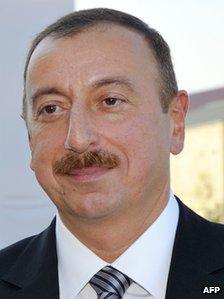Azerbaijan profile - Leaders
- Published
President: Ilham Aliyev

Ilham Aliyev succeeded his father Heydar as president
Ilham Aliyev took over as president from his father, Heydar, in 2003.
Heydar Aliyev described his son as his "political successor". When his father died, Ilham was already prime minister, vice chairman of the state oil company and deputy leader of the ruling New Azerbaijan Party (NAP).
He won the 2003 presidential elections by a landslide. Western observers were highly critical of the campaign which they said had been marred by voter intimidation, violence and media bias. Opposition demonstrations were met with police violence. There were many arrests.
Heydar Aliyev, a former Soviet Communist leader, reinvented himself as a post-independence political strongman and had ruled Azerbaijan with an iron fist since 1993 following a period of great instability. His record on human rights and media freedom was often criticised at home and abroad.
Democracy concerns
Human rights groups have also expressed profound reservations over Ilham Aliyev's commitment to democracy. But like his father before him, Ilham has been courted by the West which sees access to Azeri oil and gas supplies as a way of reducing dependency on Russia as an energy supplier.
Concerns over Mr Aliyev's democratic credentials were reinforced when police used force to break up opposition demonstrations in Baku before the November 2005 parliamentary elections in which the ruling NAP won well over half of the seats. EU and OSCE observers said the process fell far short of international standards.
Mr Aliyev won a second term of office in 2008, scoring an overwhelming victory in an election that was boycotted by the main opposition parties. He cemented his grip on power even further when a law banning the president from serving more than two terms of office was scrapped after a referendum the following year. He won again in 2013, amid now customary allegations of fraud from the opposition and election monitors.
In November 2010, the ruling NAP increased its already healthy majority in parliamentary elections, with the main opposition party failing to win a single seat. Main opposition parties boycotted the 2015 polls altogether, and reputable international observers declined to monitor them.